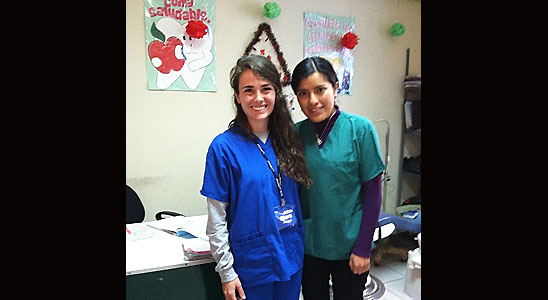UKAg student conducts clinical nutrition research in Peru
UKAg student conducts clinical nutrition research in Peru

Through a unique opportunity, an undergraduate student in the University of Kentucky College of Agriculture, Food and Environment recently shared her nutritional knowledge and conducted clinical research in South America.
“I was fortunate that I had the opportunity to conduct a research project while I was serving as a medical volunteer. Service has always been a passion of mine and experiencing it on an international level was life changing,” said Mary Boulanger, a junior human nutrition major from Lexington, who plans to go to medical school. “The project is interesting to me because while it has a focus on nutrition, it incorporates other health factors, such as physical activity and emotional health.”
She volunteered to go on a medical mission trip to Cuzco, Peru with a group of other pre-med students from the university and fulfilled a special project requirement of UK’s Honors Program. The trip was coordinated through the International Volunteer HQ and was sponsored by an independent project grant from the honors program.
As part of her trip she visited and assisted in an orphanage, retirement home and a medical clinic and participated in a rural medical campaign. She researched the dietary habits and nutritional needs in each of the four areas.
Peru has some of the highest exposure to ultraviolet light in the world, causing residents to suffer from skin and eye problems. While more than half of Peruvian children have a normal body mass index, more than 45 percent of the children under five in Cuzco suffer from anemia and more than 35 percent suffer from chronic malnutrition.
“There is so much disparity in their health due to nutrition,” Boulanger said. “In nutrition class we learned about how vitamins, minerals and water are necessary for health, but it was eye-opening to see individuals who were actually having problems because they weren’t meeting those requirements.”
Peruvian diet staples include rice, potatoes, lentils and corn. In open-air markets Boulanger saw a variety of fruits, vegetables and nuts.
“There were a lot of wonderful whole foods there, which is what any nutritionist would love to see. Since the water in Peru is contaminated with parasites and produce is often washed in contaminated water, it is recommended to peel fruits and vegetables as a precaution,” Boulanger said. “Health complications from eating contaminated food or drinking contaminated water often arise when people do not have access to water filters, or don’t have the ability to boil their water."
In her preliminary findings, she found that a local orphanage had the best diet due to individual donors and government funding. They also had successful water and vitamin campaigns so the children had access to clean water and vitamins to fill any nutritional gaps.
Residents of a local retirement home had low fruit and protein intake and less access to vitamins than the orphanage. Many retirement home residents also suffered mobility issues due to health problems. Since the retirement home operated completely on donations, there were not enough staff members to facilitate adequate physical activity for the residents.
The urban clinic saw a variety of patients, ranging from those who had malnutrition to those who had adequate access to food but ate diets rich in lard and sugar, which contributed to problems like high blood pressure and diabetes.
“Many people also came to the clinics with dental problems because proper dental hygiene is not widely taught or practiced, so it would be beneficial for the clinics to have educational classes about the necessity of brushing your teeth,” she said.
In the rural communities, she found that most of their diet consists of whole foods and is really low in fat and salt with much of the food being really healthy. However, they lack access to medical care and water filters.
This semester, she’s working with Tammy Stephenson, UK senior lecturer in the Department of Dietetics and Human Nutrition, to write a research report on her findings. In her report, she will discuss the background of each group, their dietary habits and ways they can improve their nutrition.
She will present her research at the 2014 Universities Fighting World Hunger Summit at Auburn University.
Family Consumer Sciences Nutrition Research

